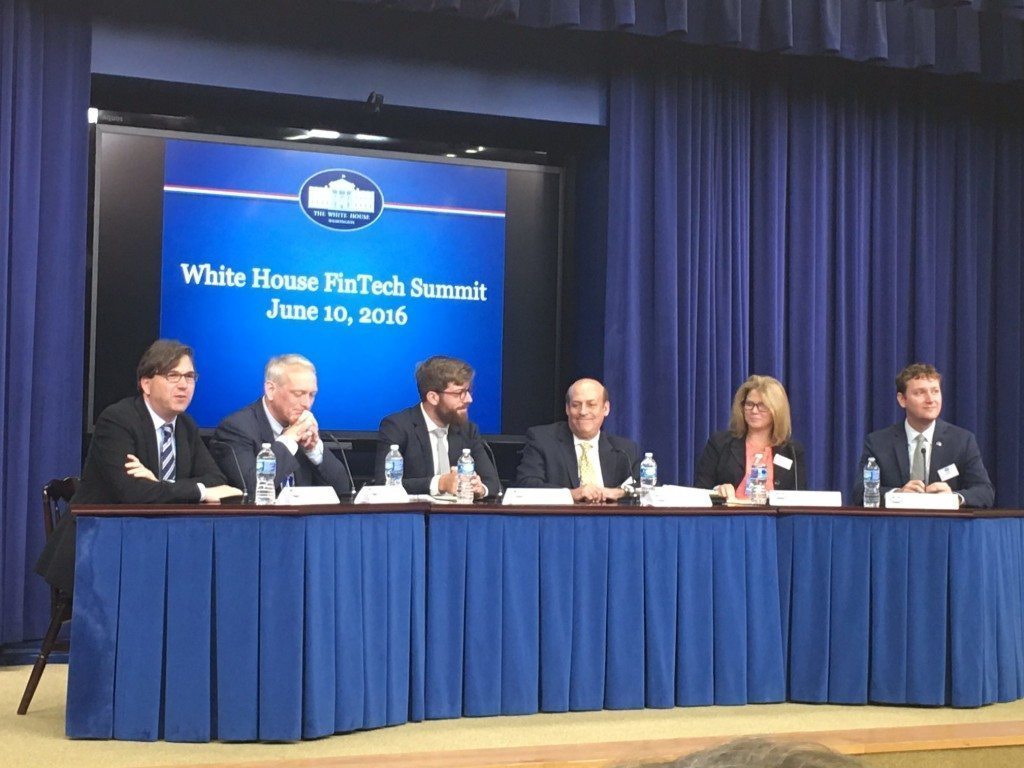
As you can tell, I found the White House meeting so interesting that I’m gonna bore you about it all week. Today is the turn of how FinTech can make us live smarter, better and more informed lives. That theme resonates as Moven’s strapline is to spend, save and live smarter (guess who came up with that phrase?), and this panel spent an hour talking about how FinTech is improving the financial health of the nation.
From left to right: Jason Furman, Chairman, the Council of Economic Affairs (moderator); Chris Carroll, Professor of Economic, John Hopkins University; Quinten Farmer, Co-Founder, Even; Rob Lavet, General Counsel, SoFi; Ida Rademacher, Executive Director, Financial Security Program, The Aspen Institute; Jon Stein, Founder and CEO, Betterment
A theme throughout the panel discussion was a very domestic rule change that may be about to preclude third parties accessing bank data via screen scrapes or APIs.
- If Banks Fear Screen Scraping, Why Are They Fighting the Alternative?
- Wells Fargo's Bid to Vanquish Screen Scraping
- Banks Don't Want to Give Access to Everything': Yodlee Exec
So who owns the data: the customer or the bank? That’s clearly a hot topic issue being debated in the USA right now. In Europe, PSD2 forces banks to open up customer data through third parties, but hey, the EU believes the customer should be in control of their own financial health and data.
The US believes the same, and the concern that some of the panellists had – particularly Chris Carroll of John Hopkins University – is that banks can use the excuse of security to lockout anyone from accessing customer data, other than the customer. If that were to happen, he felt it would be “a disaster as it would kill much FinTech”. Maybe. Certainly the loss of any account aggregation facilities would not be good news for Yodlee and co. Equally, it would provide added protection for the incumbent banks, where “the one form of life that the financial regulation will leave is the dinosaur”. Chris felt that this was the asteroid in the room, as it will kill fintech.
A member of the audience asked a question about this, stating that Section 1033 of Dodd Frank requires Open Data and wondering why the Consumer Financial Protection Bureau (CFPB) is not enforcing it? Chris responded by stating that the CFPB is the first new government agency to be created in decades, and has risen from zero staff to over 1,500 in just five years. Their challenge, as mentioned earlier this week, is that there are millions of words in Dodd-Frank – about 15 million to be exact – that need to be enforced, and the CFPB just cannot keep up with and do all of them. He felt sure they would come back to it and push to create data standards, but the question seemed to be where and when and whether it might be too late.
This exchange was intriguing as it was mentioned that JPMorgan Chase stopped sharing data with Mint and are vigorously lobbying for Congress to shut data sharing down.
Rob from SoFi agreed, and said that if banks lockout FinTech firms and others from customer data, then this could be a franchise ending scenario. In SoFi’s case credit reports have so much personal information they need access to that they couldn’t do their job without them. Rob felt that an API to access details of the government’s form 4506T, an Internal Revenue Service (IRS) document that is used to retrieve past tax returns, would make it far easier for unsecured loans as you can do most of credit analysis from that data.
Jon agreed, saying that just by getting a scan of someone’s tax return allows Betterment to come up with a specific investment plan and advisory note for that person. Jon was interesting as he also talked about robo-advisors, and said that he does not see this as a battle between robots and humans but as a battle between advice and nothing. There is no decent advice out there in general for people to learn how to save and how much is needed for retirement and so the robo advisors are there, like self-driving cars. Self-driving cars provide faster, safer and better journeys, we are taking people faster, safer and better financially. Editor’s note: Betterment are apparently launching in the UK soon.
Rob from SoFi built on this theme, saying that SoFi only exists because banks fear refinancing a federal loan into a securitised loan and, for this reason, we need better regulation because many of the rules were written before the Internet existed. He did mention that SoFi couldn't be in business without banks, as it is the banks who provide their financing to securities those loans.
Equally, from loans and robo-advice, SoFi and Betterment are both looking at better customer information, such as add-on services that offer advice. The area cited was to provide career advisory information to help people find work after losing their job.
Ida (the Aspen Institute) made an interesting point here that FinTech startups are generally solving problems in finance, because they are their own problems they are trying to solve. This reminded me of Ollie Purdue, who recently founded Loot in the UK. Loot is a bank for students and under 35 year olds, and is growing rapidly. According to Ollie, they are signing up customers at a cost of £1 a customer, as it’s all viral and social, and the bank is getting funding. Ollie is 22 himself - a young entrepreneur - and was a law student at Manchester University. He dropped out of Uni to create a bank. I asked him why? And he gave me a great answer which I paraphrase here:
I was at University and just got fed up with the fact my bank app only told me what I had spent. I needed to know what I was going to spend as my problem was could I afford to do this, not if I do this you tell me tomorrow that I shouldn’t have.
In other words banks, due to their transition from branch ledger systems to internet to mobile, are just reflecting an old debit and credit system that used to be used in branch and was moved onto an internet access and now a mobile screen. That old debit and credit branch ledger system is just tracking payments in and out. It provides no forecasting, analytics or information. Just a record of what happened. Now, with PFM (Personal Financial Management) tools, some banks are enriching that record of transactions with some supplementary information but the idea of safe to spend and here’s what’s coming is pretty hard to put into a 1980s (or older) branch ledger system.
What is even more amazing about Ollie’s and other FinTech stories is that they just don’t see the problems us old boys believe exist in banking. The old boys see barriers to entry, regulations, KYC, complexity; the new kids on the block just see opportunity. Ollie’s story about dropping out of university to create a bank reminded me of Niklas Adalberth’s story when he co-founded Klarna:
We also had one other big benefit, and that was that we had no previous banking or payment expertise. My expertise or experience came from flipping burgers at Burger King. That's all the knowledge I had when we started this business. This was a good thing because it made us rethink everything. For example, we knew immediately that we could not base this on the normal card scheme standards, as these had been designed from the 1970s or before. They do not work on the internet.
So FinTech firms solve problems that millennials find frustrating with finance and then the first people who use their products are family and friends. This, according to many of the start-ups, is what makes it easy to spot what works and what doesn’t work. As a result, the FinTech start-ups not only solve problems they want to solve for themselves, but base the core of their developments around human centred design. It’s just seeing what people are actually doing and building from there.
The beauty of this is that most financial technology until now has been built by technology firms and software houses to sell to bank decision makers. It has had little human centred design at its heart, because it wasn’t built for customers. It was built for internal bank efficiency. Like with social media, today’s open sourced technologies are allowing FinTech firms to develop financial services completely focused upon the customer, with user experience at the forefront based upon human-centred design.
Don’t ya just love that?
See Digital is all about the people for more.
Chris M Skinner
Chris Skinner is best known as an independent commentator on the financial markets through his blog, TheFinanser.com, as author of the bestselling book Digital Bank, and Chair of the European networking forum the Financial Services Club. He has been voted one of the most influential people in banking by The Financial Brand (as well as one of the best blogs), a FinTech Titan (Next Bank), one of the Fintech Leaders you need to follow (City AM, Deluxe and Jax Finance), as well as one of the Top 40 most influential people in financial technology by the Wall Street Journal's Financial News. To learn more click here...


